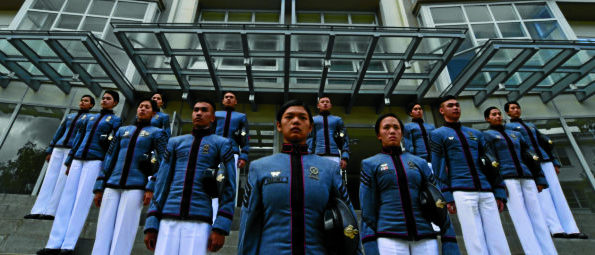Gender protection after 20 years of PMA women power

TOP GRADS Cadet First Class Rovi Mairel Martinez (center), valedictorian, leads the Top 10 of the Philippine Military Academy graduating class, which includes Cadets First Class Philip Viscaya, Eda Glis Marapao, Cathleen Jovi Baybayan, Carlo Emmanuel Canlas, Shiela Joy Jallorina, Sheila Marie de Guzman, Joyzy Funchica, Resie Jezreel Hucalla and Catherine Mae Gonzales. —EV ESPIRITU
FORT DEL PILAR, BAGUIO CITY—In 1993, 16 women were admitted to the Philippine Military Academy (PMA), becoming the first female cadets in the country’s premier military school.
Some cadets soon told them they were not welcome.
“We were told [some of the older cadets] wanted us to go AWOL (absent without leave),” said Navy Cmdr. Marissa Arlene Andres-Martinez, one of the 16 pioneers.
The frostiness of their reception was tied to the enactment of Republic Act No. 7192 (Women in Development and Nation Building Act) that allowed women to join the PMA.
Some officials believed forcing the PMA to accept women was a political imposition.
Article continues after this advertisementBut the uniformed services have developed a gender-protected environment without sacrificing the rules and systems on which a finely tuned military operates 20 years since seven of the first 16 female cadets graduated in 1997.
Article continues after this advertisementThe seven—Martinez, Maria Victoria Blancaflor, Leah Lorenzo, Ma. Consuelo Nunag, Arlene Orejana, Aireen Somera and Sheryl Uy—became symbols of women power at the academy.
Some of them, however, felt the accolade was unearned.
People still have the misconception that the male-oriented military has to change to accommodate women, “because women are supposed to be softer and vulnerable,” Martinez said.
No rules were changed
“But aside from building new accommodations and facilities for women, no rules were changed and women were trained the same way as their male counterparts. That hasn’t changed for 20 years,” she said on Sunday.
What has evolved, however, is how the military embraced gender rights.
“The military organization has matured in so many ways so that the rights of men and women [in the Armed Forces of the Philippines] are protected,” said Lorenzo (now Santiago), an Army lieutenant colonel.
The Army put up the Office of the Army Gender and Development, chaired by Blancaflor (now Agoncillo). “We call her our ‘GAD’ mother,” Martinez said.
The office helps form gender-sensitive programs for the Army, builds day care centers for children of soldiers and deals with gender-related complaints.
It could also serve other genders, Lorenzo said when asked about the potential impact of Bataan Rep. Geraldine Roman, a transgender woman, who recently joined the military reserves.
“What we learned [as the country’s first female military officers trained in the PMA] was that the military welcomes everyone, provided [they perform] to standards,” she said.
Continuing studies
But after two decades since its introduction, the program to integrate women into the military remains in its infancy, according to Lorenzo.
“Every time we have struggles, we sit down and study. We draw up position papers to resolve those problems. We have continuing studies of how females [fare] in the military,” she said.
This does not mean the AFP has not taken note of how women have excelled, she said. Almost every task and position has been given to women since the first seven PMA female graduates were given their respective commands, she said.
Lorenzo herself has seen combat, leading troops during the war waged by the Estrada administration against Moro rebels in 2000.
So did Blancaflor and Nunag (now Castillo), a Philippine Air Force pilot.
Martinez said she served as captain of a ship for six months last year. She now commands a vessel patrolling the waters off Tawi-Tawi province.
Four still active
Of the first seven women graduates of the PMA, Lorenzo, Nunag, Blancaflor and Martinez are still in active military service.
Somera (now Reyes) retired to take care of her family in Davao while Uy (now Cabasan) suffered a spinal injury after graduation. Therapy and encouragement from Martinez’s sister helped improve Uy’s condition.
Orejana, wife of Sen. Antonio Trillanes IV, has retired and has become a teacher.